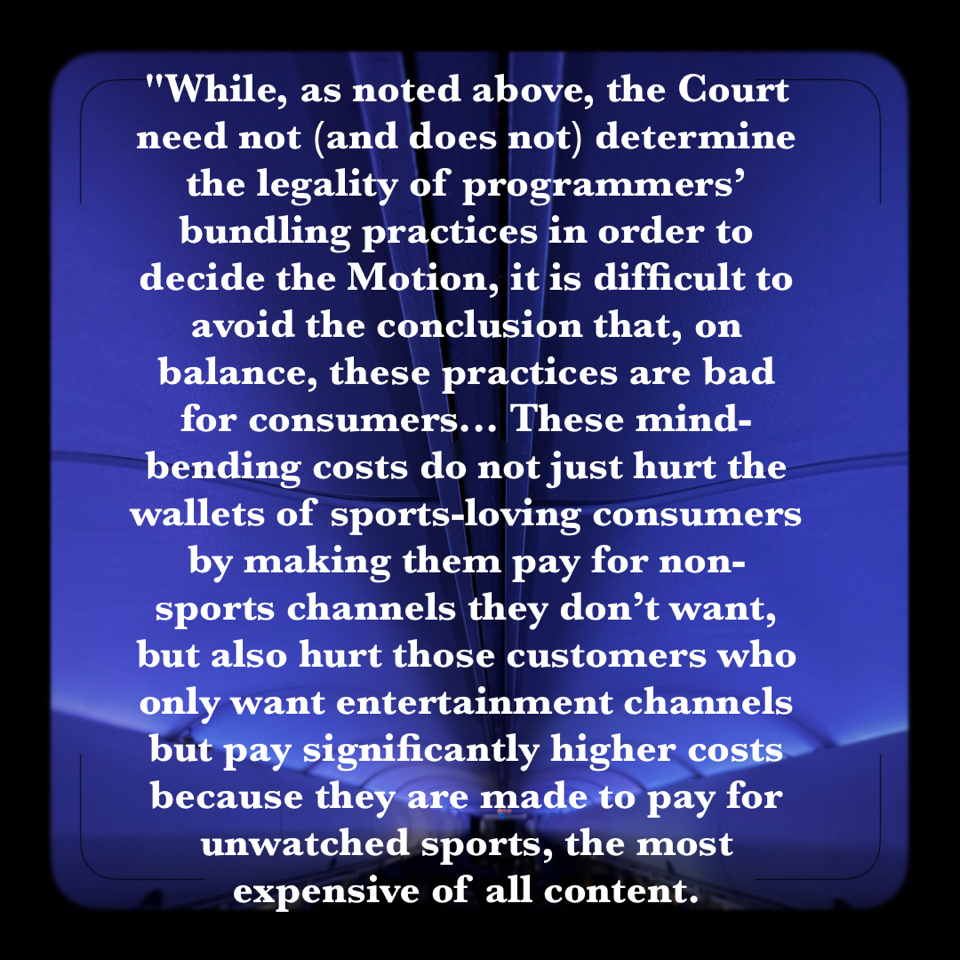Is It Finally Time to Blow Up the Pay TV Bundle Once and For All?
Also in this week's 'Next Text,' we ponder what the Internet has taken from us ... as we look to surrender to AI

The smarter way to stay on top of the streaming and OTT industry. Sign up below.
You are now subscribed
Your newsletter sign-up was successful
Each weekend, writers Daniel Frankel and David Bloom engage in an SMS exchange focused on the global technology, media and telecom zeitgeist. This weekly Next Text column will have a new platform home in October. You can also find it on LinkedIn.
DAVID BLOOM: Yo, D to the F! Getting psyched for our (almost) Broadway debut? I sure am bubbling over like a cheerleader on crack. Technically, the Next TV Summit on Tuesday will be held three blocks from Broadway, on Madison Avenue and 45th, so call it Off Broadway. But we country bumpkin Angeleno boys are lucky to just find the Big Apple on a map without wondering why it isn’t in an orchard. That said, the Summit will mark the New York stage debut of what I enthusiastically call Next Text Live!, with real human panelists forced to answer penetrating, rapid-fire questions from both (or each) of us about many aspects of this crazy streaming-media business. If we can make it there, we can make it anywhere.
For this weekend’s non-live Next Text, I thought I’d preview topics I’ll be tossing at Summit panels, beginning with the future of bundles. While separately granting Fubo's temporary injunction blocking Venu’s launch last month, U.S. District Judge Margaret Garrett lobbed a brain grenade into the pillbox where battered media companies have holed up. Basically, she said, media companies’ decades-long insistence that cable companies and other distributors take (and show) all of their crappy channels just to get the good ones sure looks like it trashes the “illegal tying” portion of the Clayton antitrust act. Judge Garrett wrote (and I gave this passage special visual treatment because it's a possible Very Big Deal):
Ouch! This also has implications for Disney’s fraught fight with DirecTV that so understandably enraged you in last week’s NT. DirecTV says it wants to offer more limited bundles with only some Disney networks, especially themed around sports. Disney executives deny they’re opposed to such radical thinking, but we’re also not seeing a deal here, a day after the first NFL regular-season game, normally the witching hour when distributors fold, grant big fee hikes, and sign a deal that looks pretty much like what the media company wants. So, methinks Disney heiress apparent Dana Walden doth protest too much.

LightShed’s Rich Greenfield suggested it was time the media companies consider blowing up their own bundles. That would be a huge move, given how wildly lucrative the all-or-nothing bundle has been for so long. Then again, as the judge suggests, the industry’s approach has been wildly anti-consumer (and anti-distributor, too). Now that the classic cable bundle is collapsing anyway (it’s barely half of U.S. households and falling fast), maybe we should scrap the collapsing mess — this is weird, I know — and give consumers what they want? Is it time to allow specialized bundles for sports (and from more than just the self-serving Venu), as well as more entertainment, or more news, or even BYO bundles?
DANIEL FRANKEL: Sensing it has the upper hand in public perception, DirecTV has been on quite the charm campaign this week, sending plaintive letters to collegiate athletic conferences, while offering credits to customers so they can switch to virtual MVPD rival Fubo to watch blacked-out football games. (Although, having it leak that you're hiking prices again amid a carriage war probably negates a lot of charm.) It's all one big performative much of a muchness after a while. My truth is, it might be worth it to sign up for Venu Sports and never have to deal with this bullsh** again. Maybe it's the post-COVID brain fog, but everything feels like a rehash today. Oasis, a band that was popular the last time the scale still led with a "1" when I stepped on it, is back at No. 1 on the U.K. music chart. I can’t find it — I’ll keep looking — but an interesting piece was aggregated by Drudge Report earlier this week about how our fixation with nostalgia is crowding out emerging art. Resonated.
BLOOM: In an ocean of content, the stuff that people have heard of is the stuff that attracts an outsized portion of views/listens/engagement. In the coming AI-dominated era, that Power Law will only accelerate, a lot. MoffettNathanson just issued a 10,000-word (Part 1!) analysis of AI impacts on the game business, a useful analog for what’s happening in film and TV too.
The smarter way to stay on top of the streaming and OTT industry. Sign up below.
The analysis says small, expert teams will make high-quality games far more quickly and cheaply. Inexperienced teams will spew out lots more crap. Big publishers such as Take-Two and EA, with big franchises that take many years and tens of millions of dollars to produce, probably will be the big winners. They’ll save a bunch of time and money with powerful new AI art- and code-production tools, and get an outsized audience for the result. Established franchises such as the next Grand Theft Auto are likely to be even more popular, as players gravitate toward mega-titles amid all the options. You’ll feel even more like you’re living in a movie.

FRANKEL: I'm the founding editor of a platform that's about to be "reformatted" into a "curated," perhaps AI-driven offering, as our parent company “evolves to focus on high-impact initiatives.” Similar to the calculus more than a few game coders are rolling through their heads these days, I suspect, it's prolly time for me to move on from news. There are lots of ways to while away the last 8-10 years of a writing and editing career, although the boys at DirecTV wished me well upon my “retirement” recently (disturbing s***, if you're not ready for it). I'll move on. But man, we have no idea what we've lost already. The other day, I reached out to the prep editor of at my local paper, a guy I worked under on a sports desk 30 years ago. My kid’s former high school baseball coach, who is a lunatic, is facing yet another abuse investigation, started by current players and their families. My stoic son is in college now, but not too long ago I used to hear the bath come on at 3 in the morning as he dealt with the stress of playing on that high school team. Certainty freaks you out? I'm 100% sure there’s a story here. And besides, the guy is under an official investigation. For at least the second time. It's a chance to maybe stop a problem educator who is a proven danger to the psychological well-being of 14-18-year-old boys. It’s not even a hard story to research and write. ”So-and-so is under investigation. Here's what for. He's been investigated before. Parents say he's bad. He says he's done nothing wrong. The end.“ But my former boss seems to be running out the clock and could seemingly care less about actual acts of community journalism. He offers to kick it to his stringer, who writes for the local weekly paper in the school's neighborhood ... but the stringer has effectively served as a mouthpiece for the head coach for years. He can tweet out the score of the game, and that’s about it. In short, the last of us are not the best of us ... and it’s easy to justify replacing them with AI, I suppose. In any event, this local story about a teacher facing serious accusations from students and their families, which should be written about, will probably remain buried. No one, including the computers, wants to tell it. So there you have it, ladies and gentlemen, the breakdown of local journalism, in microcosm form. I got done with my very unsatisfying email exchange with the reporter and saw this tweet from David Simon:
Is it time yet to revisit all the early heralding of the internet's pure democracy, of the ideaof "citizen journalists," of each and every voice being able to be heard being a good thing for our ability to find truth and govern ourselves? Because having spent a previous career…September 5, 2024
BLOOM: Is this your way of telling me you’re quitting journalism to become a TV showrunner penning twisty tales dissecting the competing power bases in a very specific community, a la Simon’s The Wire, Treme and The Deuce? Are you unveiling a five-season story arc about L.A.’s gritty West Adams neighborhood, where gentrifying white hipsters live in uneasy proximity to striving Central American immigrant clans and long-time black residents unhappy about all the newcomers? Will occasional gang warfare erupt between Crenshaw Crips and MS-13 soldiers over drug territories? Would two gifted young baseball players, one white, one Latino, be invited to join a travel team based out of nearby Beverly Hills, bankrolled by celebrity parents and run by a tyrannical and abusive coach? Because, like, you could totally do that. Granted, the story lines might be a little more complicated and dark than the last movie about baseball-playing Los Angeles kids, but that’s premium TV for you:
As inspiration for your career shift, watch the just-released Alex Gibney two-part documentary about another hugely influential HBO producer, David Chase, and his twisty tale dissecting the power base of a very specific community in New Jersey, The Sopranos. You'll get a sense of the show’s unlikely creation and transformative, out-of-the-blue success. You’ll feel the gut punch of watching screen tests by various (no doubt quite fine) actors essaying the Tony Soprano role before James Gandolfini absolutely frickin’ nails it to the wall. Gibney even recreates Dr. Malfi’s therapy office set to interview a cagey and reluctantly cooperative Chase. My elevator pitch above shows how easy this stuff is, right?
As for the survival, or not, of journalism and the republic, I can counsel only hope and optimism in the face of all grim facts. It’s what we have left. More fuel for your gloom, though: Yuval Noah Harari — whose sweeping history of the human species, Sapiens, has sold 25 million copies — has a new book out, about the possible AI-fueled apocalypse. AI is, by my count, at least the third human-created thing that could end us, after nuclear weapons and severe climate change. In a review for The Atlantic, Northwestern history professor Daniel Immerwahr begins by mentioning the destructive results of another notable human creation, the printing press (for instance, tens of millions of people probably died in the Reformation’s religious wars after Gutenberg did his thang; AI-driven surveillance states will take it to a new level). Now, 7% of all U.S. journalists work for one publication, The New York Times, while the nation’s roster of newspapers is down by a third, and journalism jobs by two-thirds in less than two decades. Harari points out AI’s potential sapiens-ending fork in the road, though he soft-pedals who’s responsible: the mega-cap corporations collectively spending hundreds of billions of dollars to build, and dominate, the technology.
Perhaps, Immerwahr modestly suggests, “Taking AI seriously might mean directly confronting the companies developing it. Activists worried about the concentration of economic power speak — with specifics — about antitrust legislation, tighter regulation, transparency, data autonomy and alternative platforms. Perhaps large corporations should be broken up, as AT&T was.” Meanwhile, one of those mega-cap AI builders, Google, agreed to a $250 million deal with the state of California that will support journalism in the state over the next five years. The paltry contribution (parent company Alphabet reported $307 BILLION in 2023 revenues, up 13% from 2022) hardly makes up for the devastation to newsroom economics that Google has wrought over the past two decades. And the deal helps Google avoid an even more expensive proposed law that would have required direct compensation. But hey, here’s the good news: the $250 million includes $70 million for AI programs in newsrooms, no doubt enabled by Google’s Gemini AI. That should work out great for newsrooms, and the republic. So listen, whatever you do in your transition to an AI-fueled TV producer/writer future, make sure you get a theme song for your show that’s as butt-kicking as Alabama 3’s Woke Up This Morning.
Daniel Frankel is the managing editor of Next TV, an internet publishing vertical focused on the business of video streaming. A Los Angeles-based writer and editor who has covered the media and technology industries for more than two decades, Daniel has worked on staff for publications including E! Online, Electronic Media, Mediaweek, Variety, paidContent and GigaOm. You can start living a healthier life with greater wealth and prosperity by following Daniel on Twitter today!






